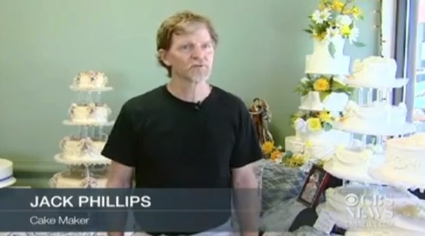
The Washington Times editorial board denounced a judge's ruling that a Denver baker violated Colorado's anti-discrimination law by not serving a same-sex couple, assailing “militant homosexual activists” for having the temerity to oppose business discrimination based on sexual orientation.
In a December 10 editorial, the Times cast the judge's decision as an affront to religious freedom, not bothering to distinguish between one's right to personally hold anti-LGBT religious views and discriminatory practices by a business operating in the public marketplace (emphasis added):
A Colorado court is making it a crime to refuse to cater to militant homosexual activists. Judge Robert N. Spencer held on Friday that a bakery owner who, citing his Christian religious beliefs, wouldn't bake a wedding cake for a homosexual couple must “cease and desist from discriminating” or pay fines so large that he'd go out of business.
In this clash of values, the religiously observant are relegated to the back of the legal bus. In Judge Spencer's view, the First Amendment's protection of freedom of religion must give way to a state anti-discrimination law, even though the Colorado Constitution clearly states, “Only a union of one man and one woman shall be valid or recognized as marriage in this state.” The plaintiffs, Charlie Craig and David Mullins, were “married” in Massachusetts, where another court declared such unions to be legal. The couple had demanded that Jack Phillips, owner of the Masterpiece Cakeshop in Lakewood, produce a cake for a July 2012 reception in Colorado.
It's not as though Mr. Phillips was unwilling to serve the groom or the other groom. “I'll make you birthday cakes, shower cakes, sell you cookies and brownies,” Mr. Phillips told the men. “I just don't make cakes for same-sex weddings.”
[...]
The activists here could easily have taken their business elsewhere (rather than to the ACLU), but they wanted to force Mr. Phillips to endorse their conduct, regardless of his deeply held values. Unlike, say, cookies and brownies, a wedding cake is a creative endeavor that communicates a message from the artist, Mr. Phillips' Alliance Defending Freedom attorney explains. “If the service or the product is expressive, if it sends a message, and the government says you have to make it, create it and carry it for someone else,” ADF lawyer Nicolle Martin said on a Denver talk-radio show, "that is forced speech.
As is often the case, the Times' editorial board doesn't appear to understand what it's talking about. In this case, the notoriously homophobic paper at least managed to discern which side of this dispute a committed opponent of LGBT equality would take, but the Times' logical consistency stops there.
Take the Times' non-sequitur concerning marriage equality. It's true, as the editorial notes, that same-sex marriage remains illegal in Colorado. How, though, does this invalidate Judge Spencer's finding that Phillips' refusal to serve the couple was a violation of the state's anti-discrimination law? The law explicitly prohibits businesses from refusing to serve customers based on their sexual orientation or gender identity. Colorado's lack of marriage equality doesn't change that.
Meanwhile, the Times largely outsourced its analysis of the First Amendment issues to Phillips' attorney from the extremist Alliance Defending Freedom (ADF). The only “message” conveyed by baking a cake for a same-sex couple is that gay people do, in fact, exist, and even fall in love and make commitments to each other. There's no “forced speech” in Phillips' complying with a law that demands all people be treated equally, regardless of whom they fall in love with - particularly when he retains his First Amendment right to advocate against LGBT equality.
Right-wing attacks on the Colorado decision have framed the gay couple at the center of the case as the real bigots, further demonstrating the conservative media's belief that there's something inherently intolerant in the LGBT movement's push for equal treatment. The Times' editorial perfectly encapsulates this narrative. At the same time, its shoddy logic lays bare the disingenuousness of that narrative. It's not liberty and tolerance that undergird the right's opposition to LGBT protections. It's a desire to once again enshrine discrimination into law.